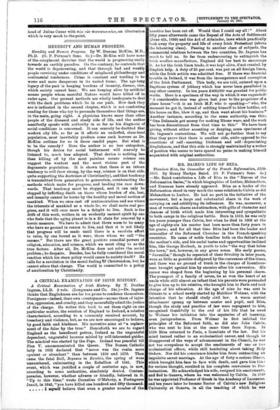HEREDITY AND HUMAN PROGRESS.
Heredity and Human Progress. By W. Duncan McKim, M.D., Ph.D. (G. P. Putnam's Sons. 6s.)—Dr. McKim will have none of the complacent doctrine that the world is progressing easily towards an earthly paradise. On the contrary, he contends that the world is degenerating, and that through bad and weakly people surviving under conditions of misplaced philanthropy and sentimental tenderness. Crime is constant and tending to be worse and more dangerous in its varied forms. The age-long legacy of the past is heaping burdens of insanity, disease, vice, which society cannot bear. We are keeping alive by artificial means people whom merciful Nature would have killed off in ruder ages. Our present methods are wholly inadequate to deal with the dark problems which lie in our path. How dark they are is indicated in the second chapter, which is not comforting reading for those who try to persuade themselves that things are, in the main, going right. A physician knows more than other people of the diseased and shady side of life, and the author manifestly speaks with authority in so far as his diagnosis of social conditions is concerned. It can scarcely be doubted that modern city life, so far as it affects an underfed, slum-bred population, must inevitably produce some such horrors as Dr. McKim outlines for us in these candid pages. But what is to be the remedy ? Here the author is no less outspoken, though his device for social betterment will scarcely be listened to, much less adopted. That device is nothing less than killing off by the most painless means science can suggest the weakest and the most vicious part of the degenerate population. It is shown that there is an inborn tendency to evil (how strong, by the way, science is on that side, quite supporting the doctrines of Christianity), and that tendency is transmitted from generation to generation, counteracting the methods which make for progress, and leading the race down- wards. That tendency must be stopped, and it can only be stopped by inflicting death on those whose burden of sin, lust, and insanity cannot be borne by the healthy and moral section of mankind. When we once east off sentimentalism and see where the interests of mankind as a whole lie, we shall make real pro- gress, and it will once more be a delight to live. Such is the drift of this work, written in an evidently earnest spirit by one who feels that the aging planet is in a fit state for renewal by a heroic measure. We have to admit that there seem to be many who have no ground in reason to live, and that it is not likely that progress will be made until there is a resolute effort to raise, by one bound as it were, those whom we call "the masses." But there are the great positive remedial powers of religion, education, and science, which we must cling to as the true factors. After all, Dr. McKim does not solve the social problem ; he despairs. Besides, has he fully considered the moral reaction which his stern policy would cause to society itself ? He calls for a revolution in the moral feeling bf Christendom, but he cannot educe that change. The world is committed to a policy of amelioration by Christianity.


















































 Previous page
Previous page